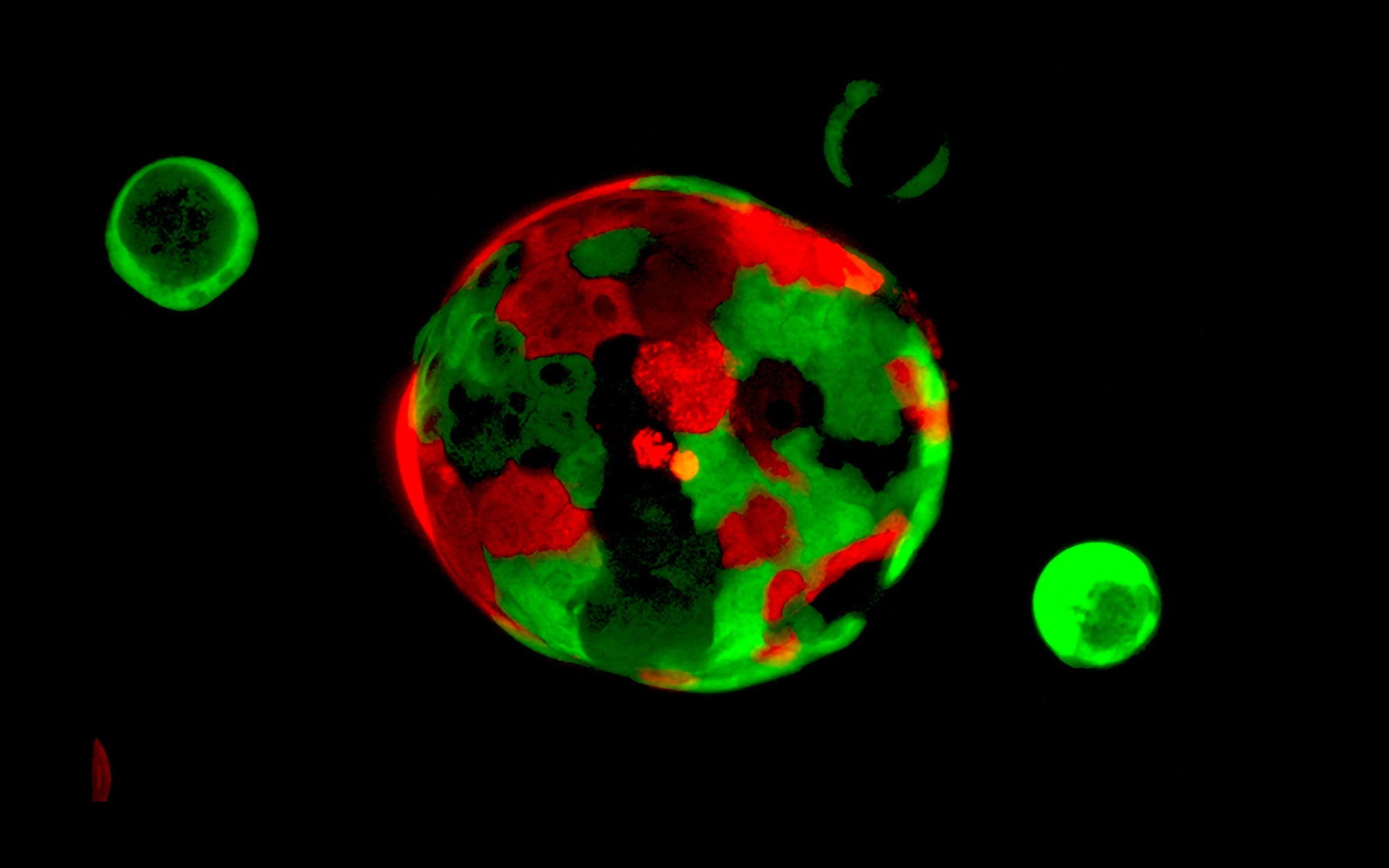Organoid technology with human tissue provides a model for full progression of the disease
Cold Spring Harbor and Bethpage, NY — Pancreatic cancer is one of the most deadly forms of cancer, with only 6 percent of patients surviving five years after diagnosis. Today, Cold Spring Harbor Laboratory (CSHL) and The Lustgarten Foundation jointly announce the development of a new model system to grow both normal and cancerous pancreatic cells in the laboratory. Their work offers the potential to change the way pancreatic cancer research is done, allowing scientists to interrogate the pathways driving this devastating disease while searching for new drug targets.
In work published today in Cell, the research team describes a three-dimensional “organoid” culture system for pancreatic cancer. Co-led by David Tuveson, CSHL Professor and Director of Research for The Lustgarten Foundation, and Hans Clevers, Professor and Director of the Hubrecht Institute and President of the Royal Netherlands Academy of Arts and Sciences, the team developed a method to grow pancreatic tissue not only from laboratory mouse models, but also from human patient tissue, offering a path to personalized treatment approaches in the future.
All cancer research relies on a steady supply of cells—both normal and cancerous—that can be grown in the laboratory. By comparing normal cells to cancer cells, scientists can then identify the changes that lead to disease. However, both types of pancreatic cells have been extremely difficult to culture in the laboratory.
Furthermore, the normal ductal cells that are able to develop into pancreatic cancer represent about 10 percent of the cells in the pancreas, complicating efforts to pinpoint the changes that occur as the tumor develops. Until now, scientists have been entirely unable to culture human normal ductal pancreatic cells under standard laboratory conditions. Because of these limitations, most pancreatic cancer research relies on genetically engineered mouse models of the disease, which can take up to one year to generate. “With this development, we are now able to culture both mouse and human organoids, providing a very powerful tool in our fight against pancreatic cancer,” explains Tuveson.
The organoids are entirely made up of ductal cells, eliminating the surrounding cell types that often contaminate samples from the pancreas. They grow as hollow spheres within a complex gel-like substance filled with growth-inducing factors and connecting fibers. Once they have grown to a sufficient size, the organoids can be transplanted back into mice, where they fully recapitulate pancreatic cancer. “We now have a model for each stage in the progression of the disease,” says Chang-Il Hwang, Ph.D., one of the lead authors working in The Lustgarten Foundation’s Pancreatic Cancer Research Lab at CSHL directed by Dr. Tuveson.
Traditionally, cancer cells are isolated during surgery or autopsies. Unfortunately, approximately 85 percent of cancer patients are ineligible for surgery at the time of diagnosis, either because the tumor is entwined in critical vasculature or the disease has progressed too far. Researchers therefore have had limited access to patient samples. The new research provides a way for scientists to grow organoids from biopsy material, which is comparatively easy to obtain. “Biopsies are the standard for diagnosis,” says Dannielle Engle, Ph.D., also a lead author on the paper. “We can now rapidly generate organoids from any patient, which offers us the potential to study the disease in a much wider population.”
The team is now working to create a repository of pancreatic tumor samples, coordinating with the National Cancer Institute. “We hope to make this available to the entire pancreatic cancer research community,” says Tuveson. Additionally, Lindsey Baker, Ph.D., another lead author of the paper, has started holding an “organoid school” for other researchers, and has already taught six laboratories from around the world this technique.
Written by: Jaclyn Jansen, Science Writer | publicaffairs@cshl.edu | 516-367-8455
Funding
This work was supported by The Lustgarten Foundation for Pancreatic Cancer Research, the Cold Spring Harbor Laboratory Association, the National Cancer Institute Center for Cancer Genomics, the Carcinoid Foundation, PCUK, and the David Rubinstein Center for Pancreatic Cancer Research at MSKCC. In addition, the work was supported by Stand Up to Cancer/KWF, the STARR foundation, the United States Department of Defense, the Sol Goldman Pancreatic Cancer Research Center, the Italian Ministry of Health, Sociedad Española de Oncología Médica, Louis Morin Charitable Trust, the Swedish Research Council, The Kempe Foundations, the Swedish Society of Medicine, the Damon Runyon Cancer Research Foundation, the Human Frontiers Science Program, the Weizmann Institute of Science Women in Science Award, the American Cancer Society, and the Hearst Foundation.
Citation
“Organoid Models of Human and Mouse Ductal Pancreatic Cancer” appears online in Cell on December 31, 2014, and will appear in the January 15, 2015 print edition. The authors are: Sylvia Boj, Chang-Il Hwang, Lindsey Baker, Iok In Christine Chio, Dannielle Engle, Vincenzo Corbo, Myrthe Jager, Mariano Ponz-Sarvise, Hervé Tiriac, Mona Spector, Ana Gracanin, Tobiloba Oni, Kenneth Yu, Ruben van Boxtel, Meritxell Huch, Keith Rivera, John Wilson, Michael Feigin, Daniel Öhlund, Abram Handly-Santana, Christine Ardito-Abraham, Michael Ludwig, Ela Elyada, Brinda Alagesan, Giulia Biffi, Georgi Yordanov, Bethany Delcuze, Brianna Creighton, Kevin Wright, Youngkyu Park, Folkert Morsink, I. Quintus Molenaar, Inne Borel Rinkes, Edwin Cuppen, Yuan Hao, Ying Jin, Isaac Nijman, Christine Iacobuzio-Donahue, Steven Leach, Darryl Pappin, Molly Hammell, David Klimstra, Olca Basturk, Ralph Hruban, George Johan Offerhaus, Robert Vries, Hans Clevers, David Tuveson. The paper can be obtained online at: http://www.cell.com/cell/newarticles.
About The Lustgarten Foundation
The Lustgarten Foundation is America’s largest private foundation dedicated to funding pancreatic cancer research. Based in Bethpage, New York, the Foundation supports research to find a cure for pancreatic cancer, facilitates dialogue within the medical and scientific community, and educates the public about the disease through awareness campaigns and fundraising events. The Foundation has provided millions of research dollars and assembled the best scientific minds with the hope that one day, a cure can be found. Cablevision Systems Corporation, a leading media and telecommunications company, underwrites The Lustgarten Foundation’s administrative costs, so 100 percent of every dollar donated to the Foundation goes directly to pancreatic cancer research. The Lustgarten Foundation and Cablevision are also partners in the curePC public awareness campaign in support of the fight against pancreatic cancer. For additional information, please visit www.lustgarten.org.
Principal Investigator

David Tuveson
Professor
Roy J. Zuckerberg Professor of Cancer Research
Cancer Center Director
M.D., Ph.D., Johns Hopkins University, 1994
